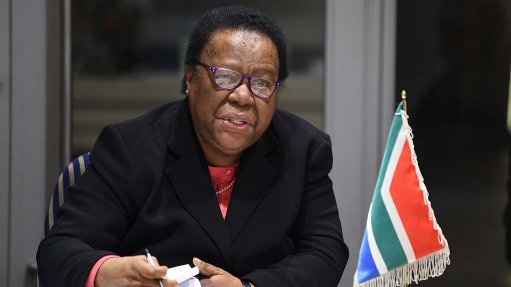
International Relations and Cooperation Minister Naledi Pandor
International Relations and Cooperation Minister Naledi Pandor says the devastating impact of the debt burden to the economies and sovereignties of several African states is hard to ignore.
Pandor was responding to a written parliamentary question from Economic Freedom Fighters (EFF) MP Thembi Msane, who wanted details on the African Union's (AU) interventions to prevent African countries from losing their sovereignty to other nations through debts and loans.
Pandor said, while AU member states determined their domestic priorities, the continental body continued its work with international lending institutions.
"Nevertheless, and to the extent to which the debt becomes a burden to AU Member States, the AU has and continues to advocate for the easing of debt burden owed by African countries, especially the less developed countries and highly indebted poor countries, which the majority from them come from the continent," Pandor said.
She added that the devastating impact of the debt burden on the economies and sovereignties of many countries on the continent was hard to ignore.
"It is for this reason that the AU has and continues to use multiple approaches to urge the developed countries, including international financial institutions, to ease the debt burden owed by African countries."
Furthermore, Pandor said AU ministers of finance and trade used the annual special technical committee of the AU to urge G7 countries, China and international financial institutions to ease the debt burden owed by African countries.
"The AU ministers of finance and trade also use the international meetings at the United Nations, World Trade Organisation, and meetings on financing for development to advocate for the easing of debt burden owed by African countries," she said.
According to Pandor, South Africa had used its chairpersonship of the AU in 2020 to advocate for the easing of debt burdens on African countries, whose ability to pay had been affected heavily by the Covid-19 pandemic.
"As early as March 2020, President Ramaphosa directly engaged with the leaders of both the World Bank and International Monetary Fund (IMF), as well as the leaders of the G7, to play their part in easing the debt burden in the continent. South Africa also used its membership of the G20 to remind the 20 largest economies in the world of the urgent need to address the debt burden and its impact on the LDCs and HIPC," she said.
On Sunday, City Press reported that Sub-Saharan African countries were losing as much as $730-million (R11.7-billion) a year due to tax avoidance strategies being implemented by multinational companies.
This was according to the IMF, which urged countries to implement targeted policy actions to reduce profit-shifting in the mining sector and avoid losses in corporate income tax revenue.
In March 2020, President Cyril Ramaphosa appointed a special envoy to secure debt relief of US$44-billion and a stimulus package of US$100- to 150-billion for African economies.
The envoy includes former SA finance minister Trevor Manuel, Ngozi Okonjo-Iweala of Nigeria, Donald Kaberuka of Rwanda, and Tidjane Thiam of Senegal.